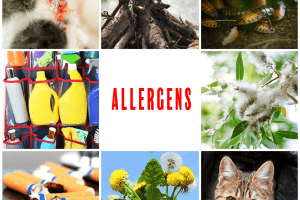Allergies, a common affliction affecting millions worldwide, can significantly diminish the quality of life for those who suffer from them. The impact of seasonal allergies triggered by year-round sensitivities to pollen, pet dander, and certain foods can be immediate and prolonged. While temporary relief is often sought through antihistamines and other medications, the question of long-term treatment looms large. This guide explores various medical and lifestyle-oriented strategies that offer lasting relief and improved well-being for allergy sufferers.
A Brief Overview of Allergies
Before delving into long-term solutions, it’s crucial to comprehend the nature of allergies. Allergies occur when the immune system overreacts to substances (allergens) that are typically harmless. Common allergens include pollen, mold, dust mites, pet dander, certain foods, and insect stings. When the body encounters these allergens, it releases chemicals such as histamines, triggering allergic symptoms.
The Distinction Between Short-Term vs. Long-Term Relief
Antihistamines, decongestants, and nasal sprays offer short-term relief of immediate symptoms like sneezing, itching, and congestion. However, these measures may only provide temporary respite and might not address the underlying causes or prevent future allergic reactions. Long-term treatment strategies aim for sustained control over allergic symptoms, improving the overall quality of life for individuals prone to allergies.
1. Immunotherapy: Building Resistance Over Time
Immunotherapy, known as allergy injections, is a long-term approach to treating allergies. This method involves exposing patients to increasing amounts to encourage their immune systems to build tolerance and reduce symptoms. Immunotherapy is particularly effective for allergies caused by insect stings, pollen, mold, and pet dander.
Advantages
- Targets the root cause by modifying the immune response.
- Provides long-lasting relief even after treatment completion.
- Reduces the need for continuous medication.
Considerations
- Requires commitment to a long-term treatment plan.
- Regular visits to the allergist for injections or adherence to prescribed drops are necessary.
- Results may take months to become noticeable.
2. Prescription Medications: Beyond Antihistamines
For individuals with persistent or severe allergies, prescription medications offer a more robust and long-term solution. Prescribed allergy medication offers many individuals targeted relief for specific symptoms. They are more potent and effective compared to over-the-counter medicines. These include:
Nasal Corticosteroids – These prescription nasal sprays effectively reduce inflammation in the nasal passages. They relieve nasal congestion, sneezing, runny nose, and other symptoms associated with allergic rhinitis.
Leukotriene Modifiers – These are oral medications that target leukotrienes, chemicals released during allergic reactions. Leukotriene modifiers are often prescribed for allergic asthma or allergic rhinitis.
Biologics – These are newer medications that target specific pathways in the immune system that trigger allergic reactions. Biologics are ideal for severe allergic reactions.
3. Environmental Control: Modifying Your Surroundings

Proofing Your Home for Allergens – Implementing measures such as using allergen-proof mattresses and pillow covers, regularly washing bedding in hot water, and minimizing the use of carpets can reduce indoor allergen exposure.
Air Purifiers – Investing in high-efficiency particulate air (HEPA) filters for air purifiers can help remove airborne allergens, providing cleaner air indoors.
Pet Allergies – For individuals allergic to pets, creating pet-free zones in the home, using air purifiers, and bathing pets regularly can minimize allergen exposure.
4. Allergen Avoidance: Identifying and Managing Triggers
Identifying and avoiding specific allergens is a fundamental aspect of long-term allergy management. This involves recognizing patterns of allergic reactions and taking steps to minimize exposure to known triggers.
Pollen Allergies: Monitoring pollen forecasts, staying indoors during peak pollen seasons, and using air purifiers can help manage allergies triggered by pollen.
Food Allergies: Individuals with food allergies must diligently read food labels, communicate dietary restrictions to others, and be prepared to administer epinephrine if necessary.
Insect Sting Allergies: Wearing protective clothing, using insect repellent, and seeking immediate medical attention after an insect sting can prevent severe allergic reactions.
5. Lifestyle Modifications: Holistic Well-Being
A holistic approach to health can contribute significantly to long-term allergy management. This involves adopting lifestyle modifications that support overall well-being, potentially alleviating the impact of allergic reactions.
Healthy Diet: Consuming a balanced and nutritious diet can strengthen the immune system and promote overall health, potentially reducing the severity of allergic reactions.
Regular Exercise: Regular physical activity can enhance immune function and well-being.
Stress Management: Practicing stress-reducing techniques, such as mindfulness and relaxation exercises, can help mitigate the impact of stress on allergic reactions.
Conclusion: Empowering Long-Term Allergy Management
A multifaceted approach is key in the pursuit of lasting relief from allergies. While immediate symptomatic relief is crucial, long-term strategies encompass a spectrum from medical interventions like immunotherapy and prescription medications to environmental modifications, allergen avoidance, and lifestyle enhancements.
The collaborative effort between individuals, healthcare professionals, and environmental adjustments empowers a comprehensive approach to managing allergies. Long-term allergy management becomes a reality by addressing the root causes and bolstering the body’s resilience, restoring individuals to a life where the seasons bring joy, not discomfort. Embrace the journey toward lasting relief and reclaim control over your allergy-prone existence.

